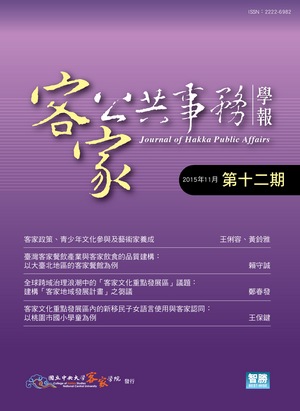Hot News
| 中文篇名 |
客家政策、青少年文化參與及藝術家養成 | |
|---|---|---|
| 英文篇名 |
Hakka Policy, Cultural Participation of the Youths and the Cultivation of Artists | |
| 作者 | ||
| 中文摘要 |
文化藝術對於青少年而言,具有深化、拓展與轉換其生命意義的價值,許多人深切意識到藝術與創意、教育的連結,與青少年一生的發展有密切關係,協助他們成為一個優秀的溝通者、問題解決者、團體合作者、創作者與思考者。更進一步而言,文化藝術提供了其認同與身分意義的連結與依附,建立起與社會或社群的網絡,維持平等與滿足共存的經驗,強化自我主體性,許多國家已將青少年文化政策列為相當優先的地位。 | |
| 英文摘要 |
The problems and challenges faced by those in today’s younger generation who deal with social, economic, political, or cultural exclusion are becoming serious issues for society on both national and international levels. The purpose of youth policy is to create conditions for learning and provide opportunities and experiences that enable individuals to develop the knowledge, skills, and competencies to carry out democracy and integrate into society. In the various dimensions of youth policy, the culture and arts have an extraordinary power to deepen, broaden and transform the lives of young people, we know about the relationship between culture and creativity and educational attainment, both in terms of identity and social attachment, to establish young people’s community network, and self-subjectivity. | |
| 關鍵詞 |
文化認同、青少年文化參與、客家政策、藝術家養成、cultural identity、cultural participation of the youths、Hakka policy、the cultivation of artists | |
| 刊名 | ||
| 期數 | ||
| 起訖頁 |
001-020 | |
| 出版單位 | ||
| DOI | ||
| QRCode |
| |
| 下一篇 |



